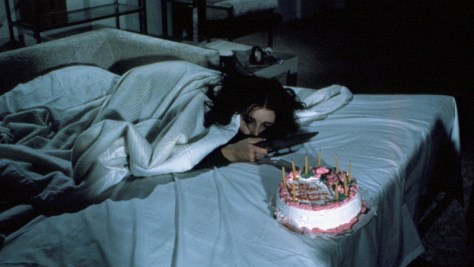
Format: Dual Format (DVD + Blu-ray)
Release date: 28 April 2014
Distributor: Arrow Video
Director: Brian De Palma
Writers: Brian De Palma, Louisa Rose
Cast: Margot Kidder, Jennifer Salt, Charles Durning
USA 1973
93 mins
My colleagues, they can make believe that Dominique is truly disturbed; I think that they will find that Danielle, who is so sweet, so responsive, so normal as opposed to her sister, can only be so because of her sister.
Present day, Staten Island, and actress Danielle Breton (Margot Kidder) has been separated from her twin, Dominique Blanchion, for some years. She meets Phillip Woode (Lisle Wilson) a kind man who seems like he’d take care of Danielle; but when her spooky ex-husband shows up on their date, it becomes clear that she has a ‘past’. When sinister events unfold, columnist Grace Collier (Jennifer Salt) sees this as her big opportunity to write the story that will finally help her to bust through the glass ceiling, and starts her own investigation into Danielle’s life.
Central to De Palma’s films is the idea that the normal and the psychotic are symbiotic: they feed from each other, and one cannot exist without the other. It makes sense therefore that he would have been drawn to making a psychological thriller based on conjoined twins; Sisters (1973) is an early incarnation of the syrupy twisted with grotesque violence. What starts as a quasi-realist thriller takes a turn simply with the appearance of a huge birthday cake to celebrate the twins’ birthday; its pink frosting flowers, the twinkling candlelight, Bernard Herrmann’s score jangling in the background, and the enormous carving knife that has been placed next to it all bode ill, yet somehow they seem to be entirely appropriate. In Carrie (1976), three years later, De Palma would combine the saccharine normality of American high school pomp with pig’s blood and telekinetic delirium, and how blissful is that mix.
Sisters is like a fairy tale that evolves into a slasher thriller, with women doing some of the thinking – at last. De Palma is good at writing material where female characters are allowed to talk to each other, and about women. Grace Collier has scenes where she speaks about her frustrations with not being taken seriously; this happens at work, and when she confronts the police as a witness to a brutal crime, their levity is clearly based on her gender. She even gets to talk directly to Danielle Breton about something other than men or children, although Danielle’s capacity for murder is not much of an upgrade. Later, in a sense, Grace metaphorically changes places with Dominique, the disturbed twin. Grace is a character with guts and intelligence, but it’s as if these qualities can be easily made equivocal with the monstrous. Only heavy-handed hypnosis can manipulate her strong mind, and she is partly silenced for her agency and will. De Palma creates aberrant women, where psychosis merges with normality, even if the narratives shut them down at the end of the films. But consider Carrie’s hand thrusting out of the soil of her newly dug grave – this lasting image serves as a reminder that the monsters are not going to go away.
It’s good to see this cult classic re-released, and to remember it as one of the films that paved the way for other great films about twins, including Kim Jee-woon’s Tale of Two Sisters (2003).
Nicola Woodham
